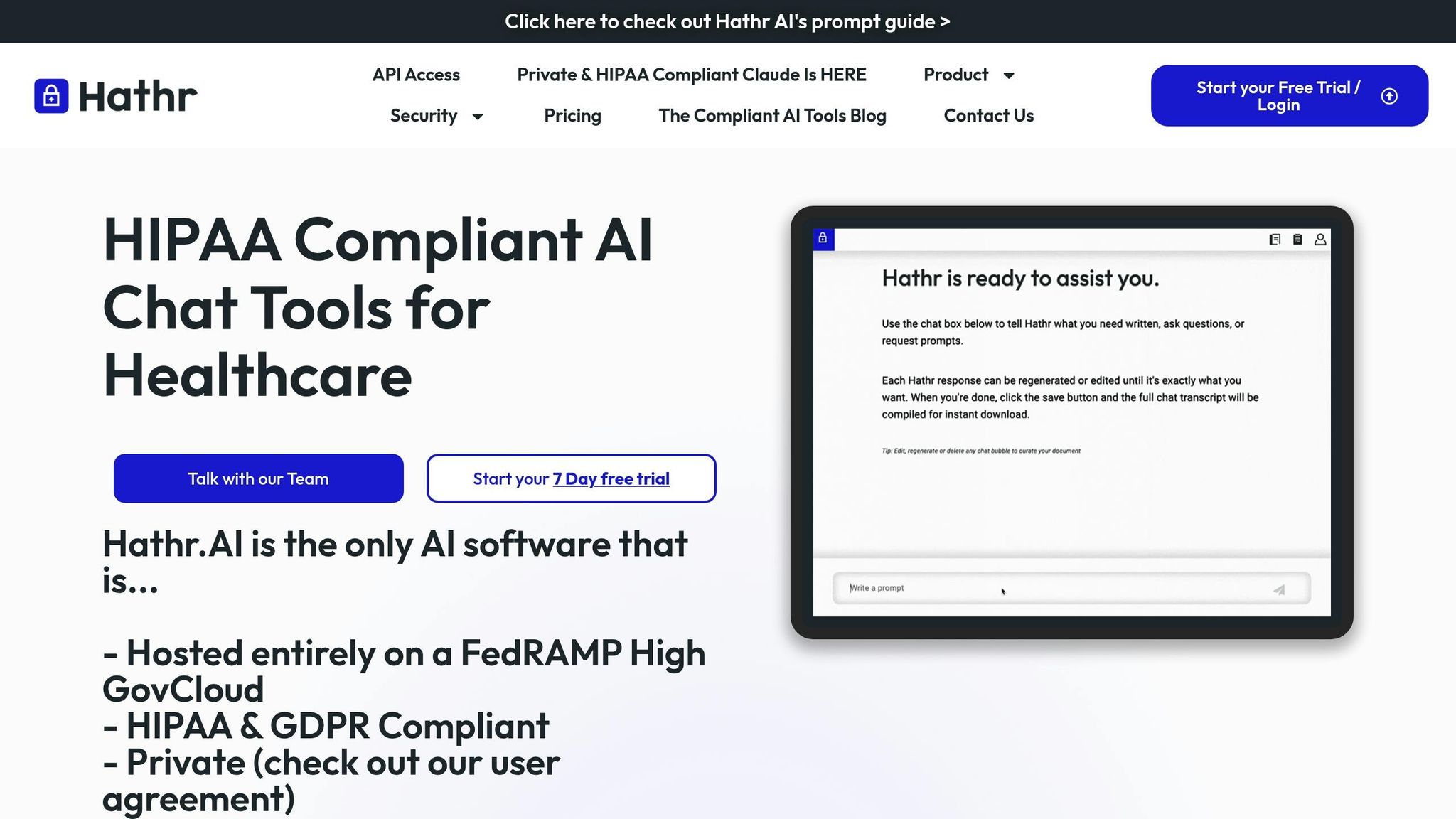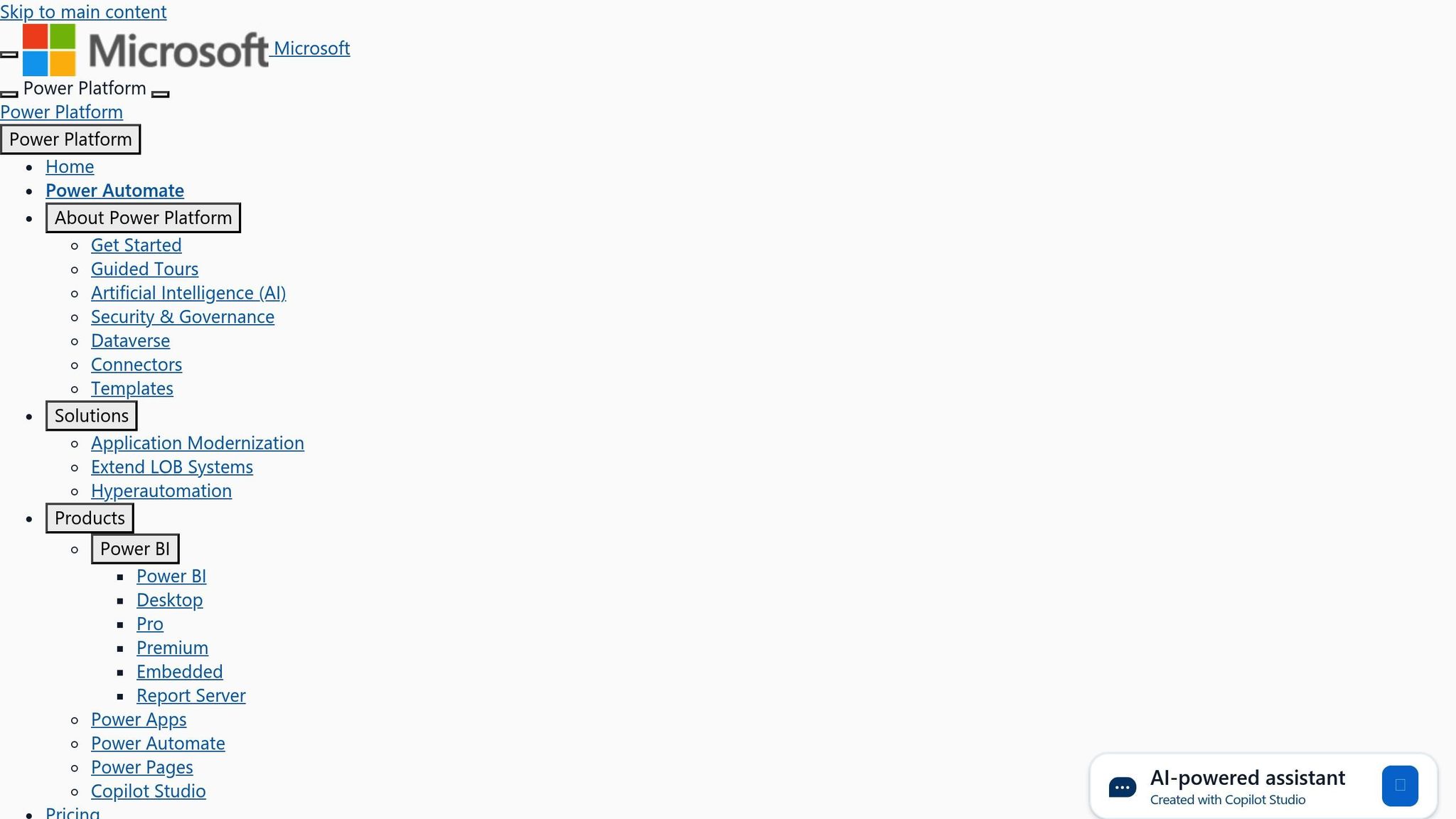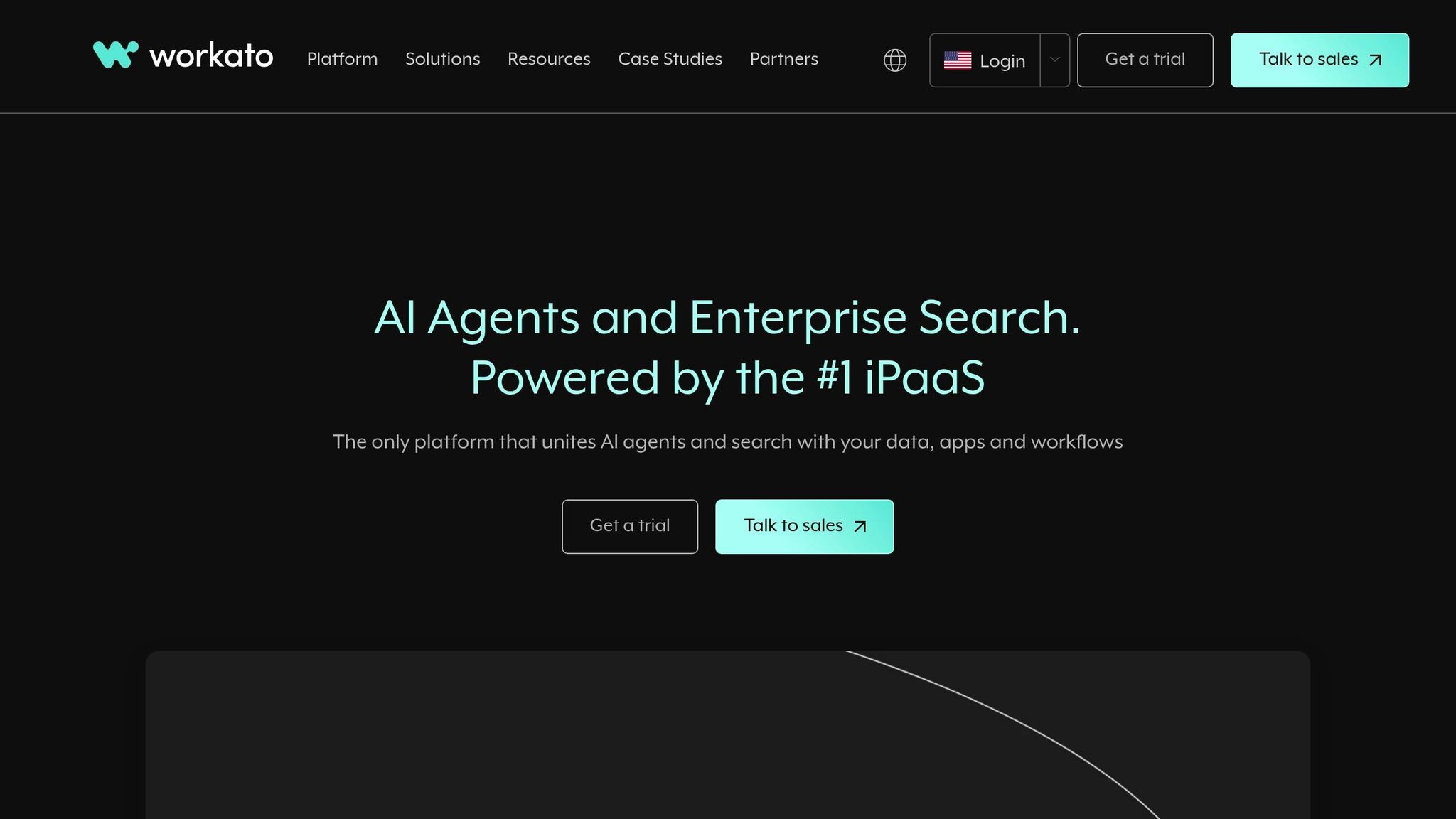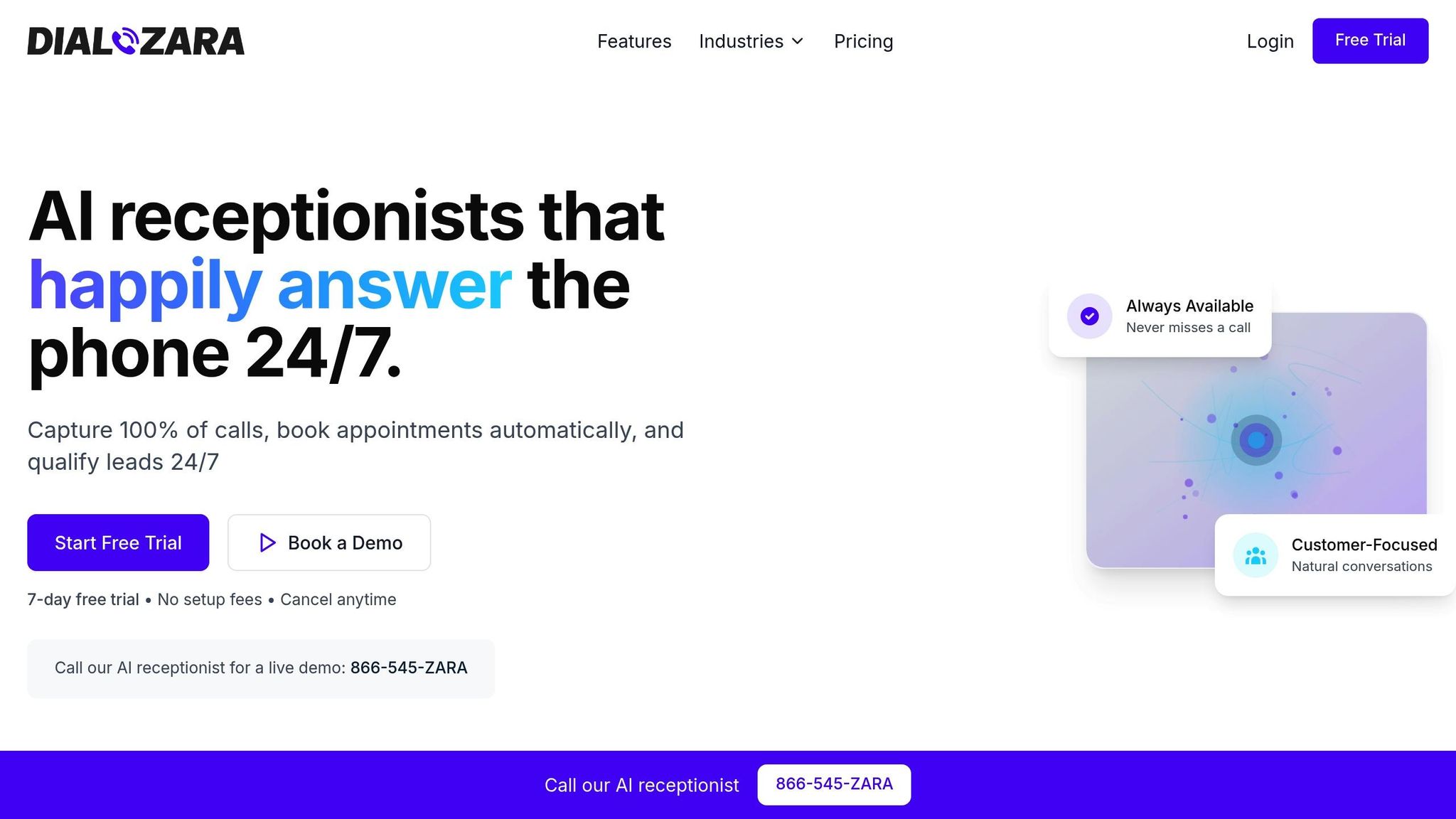
5 AI Tools for HIPAA-Compliant Healthcare
Compare secure AI solutions that protect patient data while cutting administrative tasks by up to 35x for your healthcare organization.

Written by
Adam Stewart
Key Points
- Deploy AI tools in 15 minutes vs months with proper security setup
- Prevent $4.45M average data breach costs with government-grade protection
- Cut admin work by 35x while maintaining strict HIPAA compliance
- Choose AWS GovCloud certification for maximum patient data security
Healthcare organizations need AI tools that protect patient data while meeting HIPAA standards. Here are five tools designed to ensure compliance and improve efficiency:
- Hathr.AI: A secure platform tailored for healthcare workflows, hosted on AWS GovCloud, with features like encrypted data handling, audit logs, and private AI tools.
- Microsoft Power Automate: Automates workflows like appointment reminders and data entry, with built-in compliance features and integration with EHR systems.
- Workato: Offers scalable automation for healthcare, integrating thousands of applications securely with role-based access controls and encryption.
- Dialzara: An AI-powered virtual phone assistant for patient communication, handling tasks like scheduling and message relay, with quick setup and low cost.
- Comparison Table: A quick breakdown of features, pricing, and deployment times for each tool is provided below.
Quick Comparison
| Feature | Hathr.AI | Microsoft Power Automate | Workato | Dialzara |
|---|---|---|---|---|
| Primary Function | Secure healthcare workflows | Workflow automation | Scalable system integrations | AI phone answering |
| HIPAA Compliance | FedRAMP High GovCloud hosted | Built-in compliance features | Enterprise-grade security | Fully HIPAA-compliant |
| Deployment Time | Varies | Days to weeks | Weeks to months | 15–30 minutes |
| Pricing | Custom enterprise pricing | $15–$40/user/month | Custom enterprise pricing | $29/month |
| Integration Options | Healthcare-specific APIs | Extensive connector library | 10,000+ pre-built connectors | 5,000+ business apps |
| 24/7 Availability | Dependent on setup | Automated workflows | Automated workflows | Continuous operation |
| Setup Complexity | Moderate to complex | Low to moderate | Moderate | Simplest setup |
| Healthcare Focus | High | Moderate | Moderate | High |
These tools help healthcare providers maintain compliance, improve processes, and safeguard patient data effectively. Choose based on your needs for workflow automation, integration, or patient communication.
Hathr.AI: AI Platform for Secure Healthcare Workflows

Hathr.AI is an advanced AI platform specifically designed to meet the needs of healthcare organizations that handle Protected Health Information (PHI). It tackles the unique security hurdles that arise when integrating AI into sensitive healthcare workflows.
The platform operates within AWS GovCloud (FedRAMP High), adhering strictly to HIPAA standards to safeguard data. Its infrastructure, managed by former National Security Professionals and hosted entirely in the United States, ensures that sensitive information is protected in government-grade environments. This level of security is critical, especially considering that in 2023, an average of 364,571 healthcare records were breached daily, with each breach costing approximately $4.45 million in damages. Below, we’ll explore Hathr.AI's standout features and the measurable benefits it brings to healthcare operations.
Key Features of Hathr.AI
Hathr.AI sets itself apart with a range of high-security, enterprise-grade features tailored for the healthcare industry. Hosted exclusively on AWS GovCloud with FedRAMP High certification, the platform meets the rigorous security standards of the Department of Health and Human Services. It ensures strict data isolation, preventing any overlap or mixing of client data.
Key capabilities include private AI chat tools and developer-friendly APIs that seamlessly integrate with existing HIPAA-compliant systems. All staff members are U.S. citizens, and Hathr.AI does not claim ownership of customer data, ensuring that organizations retain complete control over their information. The platform is also NIST 800-171 certified and can be deployed directly within a healthcare organization’s IT infrastructure. Data is encrypted both during transmission and while stored, with detailed audit logs tracking all data access and processing activities.
Benefits for Healthcare Organizations
These features provide tangible benefits for healthcare teams. Hathr.AI users report productivity gains of up to 35 times compared to manual processes. For instance, Dr. Nicole J. used the platform to sift through hundreds of patient records in just minutes, identifying a specific case and generating a concise summary.
"We looked for AI options with security similar to Hathr AI during the acquisition process – there are none."
– Head of Compliance, Health In Tech Inc.
The platform's adaptability allows healthcare providers to automate a variety of workflows, such as medical record reviews and insurance pre-authorizations, without sacrificing data security. Organizations can request Business Associate Agreements and other compliance documentation directly from Hathr.AI, ensuring all HIPAA requirements are met. Additionally, its seamless integration with existing systems enhances operational efficiency while upholding stringent security measures.
Microsoft Power Automate: Workflow Automation with Compliance

Microsoft Power Automate simplifies healthcare workflows while adhering to HIPAA regulations. It comes with a Business Associate Agreement (BAA) that addresses key areas like data protection, breach reporting, and access controls. However, healthcare organizations are still responsible for implementing their own safeguards to fully comply with HIPAA requirements.
The platform includes robust security features such as encryption for data in transit and at rest, access controls, audit logging, and data loss prevention measures. With over 81% of healthcare organizations relying on cloud solutions and the average cost of a data breach reaching $9.23 million, these tools are essential for safeguarding sensitive patient information.
Key Use Cases in Healthcare
Leveraging its compliance framework, Power Automate is instrumental in streamlining healthcare operations. It integrates seamlessly with Electronic Health Record (EHR) systems to automate tasks like data entry and triggering real-time alerts, helping to reduce manual errors and improve the speed of patient care. Appointment reminders - delivered via SMS, email, or Microsoft Teams - are automated while maintaining encryption to protect sensitive data. Additionally, the platform supports the secure sharing of patient updates and test results through Teams or email notifications.
In February 2024, Keragon highlighted that Power Automate boosts operational efficiency by automating repetitive tasks such as appointment scheduling, data entry, and report generation. These automations not only reduce errors but also free up healthcare professionals to dedicate more time to patient care.
The platform also enables workflows designed to meet regulatory standards, ensuring data encryption and access restrictions are in place. These capabilities are enhanced by Power Automate's extensive integration features, making it a versatile tool for healthcare organizations.
Integration and Flexibility
One of Power Automate's standout features is its ability to integrate with Microsoft 365 and a wide range of third-party applications. This adaptability allows healthcare providers to connect their existing systems without requiring major infrastructure overhauls. The platform includes customizable templates for processes like patient intake and insurance pre-authorization, and it supports role-based access controls to comply with HIPAA's principle of limiting access to only what is necessary.
Power Automate supports compliance by enabling workflows that collect only essential data and maintain detailed audit logs. It also automates regulatory tasks, such as handling data subject requests and ensuring third-party services have the necessary BAAs in place. Like other advanced tools in healthcare, Power Automate helps deliver secure, efficient, and compliant solutions for patient care.
Workato: Scalable Automation for Healthcare

Workato offers a robust automation platform tailored for healthcare organizations, combining efficiency with strict HIPAA compliance. By automating workflows across both cloud and on-premises applications, Workato helps healthcare providers securely integrate diverse systems, resulting in streamlined operations and improved resource management.
The platform's impact is evident in its ability to deliver measurable results. Healthcare organizations using Workato report a 283% return on investment (ROI) within just six months and save over 100,000 hours through automation. These time and cost savings are vital in healthcare, where staff efficiency directly affects patient care.
With pre-built connections to over 10,000 applications, Workato eliminates the need for costly infrastructure changes. This broad compatibility allows organizations to integrate systems seamlessly, creating a unified view of patient data that supports better decision-making.
Security Features
Workato is designed with a multi-layered security framework to protect sensitive healthcare data. It employs end-to-end encryption with unique encryption keys for each account, which are refreshed hourly to provide additional protection against breaches.
A standout feature is the Enterprise Key Management (EKM) system, which gives healthcare providers control over their encryption keys through external key management services. This feature ensures compliance with regulations regarding data sovereignty and access control.
The platform also uses Role-Based Access Control (RBAC) to enforce strict access policies. Administrators can set up separate workspaces for different teams, ensuring that staff can only access information relevant to their roles. Additional safeguards include data masking during development, audit logging for tracking activities, and real-time alerts to identify potential security threats.
Healthcare Application Integrations
Workato excels at integrating complex healthcare systems, enabling seamless workflows across electronic health records (EHRs), billing systems, patient portals, and administrative tools. Its support for both cloud-based and on-premises systems makes it a versatile solution for organizations with mixed technology infrastructures.
To ensure secure integrations, Workato uses OAuth 2.0 for external connections and protects stored credentials with 256-bit encryption. These measures help maintain the integrity of the entire healthcare data ecosystem, reducing the risk of vulnerabilities at integration points.
The platform also empowers healthcare organizations to generate real-time analytics for both employees and patients, boosting operational efficiency while adhering to strict data security standards. Additionally, Workato automates compliance-related tasks, such as notifying employees about required training and certifications, helping organizations avoid regulatory pitfalls.
A compelling example of Workato's capabilities comes from Fullerton Health. Alvin Lim, Group Technology and Information Security Director, shared:
"We don't position Workato as an IT solution; it's a tool that helps our whole company be more efficient & effective. The results speak for themselves and our users can be part of the game as well, innovating as citizen developers."
Workato also supports multi-phase development lifecycles, allowing healthcare providers to build, test, and deploy automations in separate environments before going live. This approach minimizes risks such as system downtime or data integrity issues during implementation.
Finally, Workato upholds several key security certifications, including HIPAA, ISO 27001, ISO 27701, SOC 1 Type II, SOC 2 Type II, PCI-DSS Level 1, and IRAP. Healthcare providers should ensure they establish a Business Associate Agreement (BAA) with Workato to maintain HIPAA compliance.
sbb-itb-ef0082b
Dialzara: AI Virtual Phone Answering Service

Dialzara offers a HIPAA-compliant AI phone answering solution designed to revolutionize how healthcare providers handle patient communication. Built to meet strict HIPAA standards, the platform ensures secure and efficient interactions. Its AI capabilities are tailored for the medical field, understanding complex terminology and seamlessly managing healthcare workflows - all while prioritizing data security.
One of the biggest challenges in healthcare is missed calls and limited patient access. Dialzara directly addresses this issue. Practices using the service have reported a dramatic increase in call answer rates, jumping from about 38% to an impressive 100%. This ensures patients can always connect with their providers when it matters most, creating a smoother, uninterrupted line of communication.
AI Voice Technology and 24/7 Availability
Dialzara’s advanced AI voice technology operates around the clock, providing consistent and reliable patient support. The AI can handle tasks like scheduling appointments, relaying messages, and transferring calls. Using healthcare-trained natural language processing, it understands medical terminology, which means patient inquiries about medications, symptoms, or appointment updates are processed accurately and directed to the right place.
This 24/7 availability is especially crucial for urgent care needs, after-hours questions, and scheduling outside traditional office hours. Throughout all interactions, the AI maintains a professional tone and ensures sensitive information is handled securely, meeting HIPAA requirements.
Seamless Integration with Business Applications
Dialzara integrates with over 5,000 business applications, including top electronic health record (EHR) systems like Epic, Cerner, and Allscripts. By leveraging FHIR-standard APIs, it enables smooth data exchange with existing healthcare IT systems, reducing manual data entry and minimizing errors. Beyond EHRs, the platform connects with practice management tools, billing systems, and patient portals, automating workflows such as appointment confirmations and insurance checks.
Cost Efficiency and Quick Setup
For healthcare organizations, Dialzara offers significant cost savings - up to 90% on staffing expenses - without compromising the quality of patient interactions. Priced at just $29 per month, it provides an affordable alternative to hiring additional reception staff. Even better, the setup process is quick and straightforward, taking only 15–30 minutes. Administrators simply create an account, input business details to train the AI, select a voice and phone number, and configure call forwarding.
To help practices evaluate its effectiveness, Dialzara includes a 7-day free trial, allowing real patient interactions before any commitment. This rapid deployment eliminates common hurdles in adopting AI, enabling healthcare providers to streamline call handling and improve patient communication in a matter of days.
Feature Comparison Table
When choosing AI tools for healthcare settings, it's important to assess each platform's specific features to make an informed decision. All four tools outlined here prioritize HIPAA compliance, but they serve distinct purposes. The table below highlights their key differences for easy comparison.
Comparison Table
| Feature | Hathr.AI | Microsoft Power Automate | Workato | Dialzara |
|---|---|---|---|---|
| Primary Function | AI platform for secure healthcare workflows | Workflow automation with compliance | Scalable automation for healthcare | AI virtual phone answering service |
| HIPAA Compliance | FedRAMP High GovCloud hosted; HIPAA & GDPR compliant | Built-in compliance features with a BAA | Enterprise-grade security with a BAA | HIPAA-compliant with secure data handling |
| Deployment Time | Varies by complexity | Days to weeks | Weeks to months | 15–30 minutes |
| Pricing Model | Custom enterprise pricing | $15–$40/user/month | Custom enterprise pricing | $29/month |
| Integration Capabilities | Healthcare-specific APIs | Extensive connector library | Numerous pre-built connectors | Integrates with over 5,000 business applications |
| 24/7 Availability | Platform dependent | Automated workflows | Automated workflows | 24/7 continuous operation |
| Setup Complexity | Moderate to complex | Low to moderate | Moderate | Simplest |
| Target Use Cases | Key healthcare workflows | Administrative workflows, data synchronization | Complex enterprise integrations | Patient communication, appointment scheduling |
| Healthcare Specialization | High – purpose-built for healthcare | Moderate – general platform with healthcare applications | Moderate – enterprise focus with healthcare capabilities | High – healthcare-trained AI with medical terminology |
| Staffing and Operational Savings | Varies by implementation | Varies | Varies | Up to 90% on staffing costs |
This table paints a clear picture of each tool's strengths. Hathr.AI shines as a specialized healthcare AI platform hosted on FedRAMP High GovCloud, making it an excellent choice for organizations requiring top-tier security. Its design focuses on optimizing a variety of healthcare workflows.
Microsoft Power Automate and Workato excel in offering extensive integration options and flexible pricing. While both cater to healthcare, they also serve broader industries, making them versatile but less tailored to specific healthcare needs.
Dialzara, however, stands out for its simplicity and quick deployment. With a $29 per month pricing model and setup time of just 15–30 minutes, it’s ideal for practices needing immediate solutions. Its healthcare-focused AI is trained to understand medical terminology, making it particularly effective for patient communication, appointment scheduling, and reducing missed calls - even after hours.
For organizations looking to avoid lengthy integration processes, Dialzara offers a hassle-free alternative. On the other hand, platforms like Hathr.AI provide deeper customization but may require more time and resources to implement.
Each tool tackles HIPAA compliance and operational efficiency differently, offering healthcare providers the flexibility to choose the solution that best aligns with their specific needs.
Conclusion
As explored above, HIPAA-compliant AI tools play a pivotal role in reshaping healthcare while safeguarding patient privacy. The healthcare industry stands at a turning point where artificial intelligence is revolutionizing diagnosis, treatment, and patient management. This makes adherence to HIPAA regulations not just a legal requirement but a critical component of ethical and effective care.
The tools reviewed demonstrate how HIPAA-compliant AI can enhance operational efficiency and strengthen data security. These advancements contribute to better patient outcomes and help reduce the administrative load on healthcare professionals.
The urgency for compliance is underscored by regulatory actions. The FTC has emphasized the importance of protecting health data, making HIPAA compliance a priority for AI developers and vendors. Moreover, 98% of encrypted AI healthcare organizations successfully recovered from ransomware attacks in 2024, showing the importance of strong security protocols.
For healthcare organizations, adopting HIPAA-compliant AI isn't just about meeting regulations - it’s about maintaining the trust of patients and avoiding costly penalties. When evaluating AI tools, organizations should look for vendors that can demonstrate robust security measures, provide signed Business Associate Agreements, and showcase a proven history of compliance. Whether the goal is automating workflows, integrating systems, or improving patient communication, selecting tools that align with operational needs while protecting privacy is non-negotiable.
The integration of AI in healthcare requires a delicate balance between embracing innovation and ensuring privacy. By addressing compliance and data protection challenges today, organizations can position themselves to fully leverage AI's potential while preserving patient trust and confidentiality. These technologies are shaping a future that promises greater efficiency and security in healthcare.
FAQs
How do AI tools stay HIPAA-compliant while working with healthcare systems?
AI tools ensure they meet HIPAA requirements by implementing strong security protocols like data encryption, access controls, and audit logging to safeguard sensitive patient information. Regular risk assessments are also conducted to confirm their data management practices align with HIPAA regulations.
On top of that, these tools set up Business Associate Agreements (BAAs) with healthcare providers and vendors. These agreements clearly define the responsibilities for handling Protected Health Information (PHI), allowing the tools to integrate smoothly with healthcare systems while maintaining strict patient privacy and security standards.
What should healthcare organizations consider when selecting AI tools for workflow automation?
When evaluating AI tools for automating workflows in healthcare, it's important to keep a few critical factors in mind:
- HIPAA compliance and data security: The tool should meet stringent legal and privacy requirements to safeguard sensitive patient information.
- Fit with organizational objectives: Choose solutions tailored to your needs, whether that’s simplifying administrative processes or improving patient care.
- Ease of integration and scalability: Opt for tools that can seamlessly blend into your current systems and expand as your organization grows.
- Defined automation goals: Clearly outline the tasks you want to automate and confirm the tool is capable of handling them effectively.
Focusing on these aspects ensures that the AI solutions you implement boost efficiency while upholding trust and regulatory compliance in healthcare.
How does Dialzara help healthcare providers manage patient communication and appointment scheduling while staying HIPAA-compliant?
Dialzara streamlines patient communication and appointment management with AI-powered automation that complies with HIPAA regulations. It securely manages tasks such as booking, rescheduling, and canceling appointments, all without human intervention, ensuring that protected health information (PHI) remains confidential.
With robust security protocols and adherence to strict privacy standards, Dialzara enables healthcare providers to dedicate more time to patient care while staying compliant. Its virtual phone agent is available around the clock, providing a dependable and efficient way to handle patient interactions effortlessly.
Summarize with AI
Related Posts
HIPAA Compliance in AI Client Intake
Learn how AI client intake systems can maintain HIPAA compliance while enhancing data security and streamlining workflows.
HIPAA-Compliant AI Phone Agents for Healthcare
Explore how HIPAA-compliant AI phone agents enhance patient communication, ensuring security and efficiency in healthcare interactions.
AI in Healthcare: Balancing Patient Data Privacy & Innovation
Explore the benefits and risks of using AI in healthcare, along with strategies to balance patient data privacy and innovation. Learn how emerging technologies could shape the future of healthcare AI.
HIPAA Compliance with AI: What SMBs Need to Know
Learn how AI can help small healthcare businesses streamline HIPAA compliance, enhance data security, and improve patient communication.
